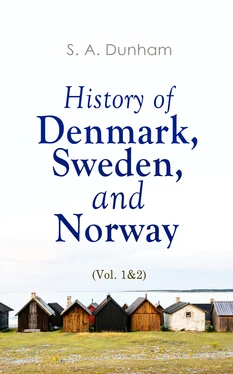S. A. Dunham - History of Denmark, Sweden, and Norway (Vol. 1&2)
Здесь есть возможность читать онлайн «S. A. Dunham - History of Denmark, Sweden, and Norway (Vol. 1&2)» — ознакомительный отрывок электронной книги совершенно бесплатно, а после прочтения отрывка купить полную версию. В некоторых случаях можно слушать аудио, скачать через торрент в формате fb2 и присутствует краткое содержание. Жанр: unrecognised, на английском языке. Описание произведения, (предисловие) а так же отзывы посетителей доступны на портале библиотеки ЛибКат.
- Название:History of Denmark, Sweden, and Norway (Vol. 1&2)
- Автор:
- Жанр:
- Год:неизвестен
- ISBN:нет данных
- Рейтинг книги:5 / 5. Голосов: 1
-
Избранное:Добавить в избранное
- Отзывы:
-
Ваша оценка:
- 100
- 1
- 2
- 3
- 4
- 5
History of Denmark, Sweden, and Norway (Vol. 1&2): краткое содержание, описание и аннотация
Предлагаем к чтению аннотацию, описание, краткое содержание или предисловие (зависит от того, что написал сам автор книги «History of Denmark, Sweden, and Norway (Vol. 1&2)»). Если вы не нашли необходимую информацию о книге — напишите в комментариях, мы постараемся отыскать её.
The Pagan Age:
Denmark (B.C. 40 to A.D. 1014)
Sweden (A.C. 70 to A.D. 1001)
Norway (about A.C. 70 to A.D. 1030)
Maritime Expeditions of the Northmen During the Pagan Times:
In England, France, and Ireland
Maritime Expeditions of the Northmen During the Pagan Times:
In the Orkneys, the Hebrides, Iceland, Greenland, North America, Russia, etc.
Cosmogony and Religion of Scandinavia
Introduction of Christianity Into Denmark and Sweden
The Middle Age:
Denmark (1014-1387)
Norway (1030-1387)
Sweden (1001-1389)
History of Denmark, Sweden, and Norway (Vol. 1&2) — читать онлайн ознакомительный отрывок
Ниже представлен текст книги, разбитый по страницам. Система сохранения места последней прочитанной страницы, позволяет с удобством читать онлайн бесплатно книгу «History of Denmark, Sweden, and Norway (Vol. 1&2)», без необходимости каждый раз заново искать на чём Вы остановились. Поставьте закладку, и сможете в любой момент перейти на страницу, на которой закончили чтение.
Интервал:
Закладка:
Prior to the reign of Dan , the son of Humble, Denmark, like the whole of the north, was subject to chiefs—whether hereditary or elective we need not inquire. But such a form of government had its evils. A hundred tyrants were more galling than one; and Dan, who gave his name to the nation, was invested with an authority superior to the other chiefs, and with the regal title. On his death, the sceptre passed by election, and not by inheritance, into the hands of his son Humble ; but the people found that monarchy, too, has its curses, though they are neither so numerous nor so great as those inseparable from an aristocracy. Lother , the brother of Humble, revolted, was victorious, and enabled to usurp the regal dignity. As he had been a rebellious subject, so he made a tyrannical king. The most illustrious of the Danes he deprived of property or life, until a conspiracy served him as he had served so many others. Skiold , the son of Lother, was raised to the vacant dignity, a proof (always supposing the traditionary guides of Saxo to be worthy of credit) that the hereditary principle has great force even in the most ancient forms of society; indeed, the application of this principle to the chief magistracy of the state, is the natural and almost inevitable result of the patriarchal system—a system which we all know to be coëval with the existence of the world. Skiold was the Hercules of his age; and at a time when wild beasts disputed with man the empire of the forest, he was a greater benefactor than if he were merely a warrior. Even in his youth he was a prodigy; he would seize and fetter the most savage bear, leaving to his followers the less noble task of despatching the monster. Yet he frequently struggled with the bravest of his own species; no wrestler of Scandinavia could withstand him; in a single combat, he overthrew the duke of the Alemanni or Swabians, his army and that of his enemy being spectators; reduced that people to the condition of tributaries, and returned home in triumph, accompanied by the daughter of the duke, the beautiful Awilda, whom he made the partner of his throne. Nor was he less distinguished for wisdom than for valour. He was a legislator: bad laws he abolished, and enacted such as were required by an improved state of society. He was a great friend to the poor and the afflicted; the debts of others he often paid from his own treasury; the spoils taken in battle he uniformly abandoned to his followers; and it was one of his noble sayings, that, while money was the reward of the soldier, glory was enough for the general. So much esteemed, indeed, was this prince, that his posterity were glad to derive additional distinction from his name; and the Skioldungs, or the descendants of Skiold, were long dear to Denmark. [15]
Gram , the son of Skiold, and the fifth king, was endowed with equal strength and equal enterprise, and his life was more romantic. His first consort was the daughter of his tutor or governor, a grim old chief; but thinking this lady beneath him, or, more probably, anxious to reward his brother in arms, Bessus, he soon bestowed her upon that hero. The dearer the gift, the greater the merit of the action; nor are similar instances of liberality wanting in other pagan heroes of the north. Probably Gram undervalued a conquest so easy as the wife he thus presented to his friend; and his ambition was roused by the hope of obtaining a lady whom nothing short of the highest courage could win. Gro, the daughter of Sigtrug, king of the Swedes, had been affianced to a giant, viz., a Jute or a Finn. Indignant at this prostitution of royal blood and virgin modesty, the Danish monarch, attended by his never-failing companion, Bessus, passed into Sweden, killed the relatives of Gro, subdued the country, and brought away the princess in triumph. [16]But, with all his valour, Gram was inconstant. Leading his army against the king of the Finns, he was so struck with the beauty of that monarch’s daughter, that he was speedily converted from an enemy into a suitor; and he obtained a promise of her hand on the condition of repudiating Gro. Scarcely, however, had he left the Finnish territory, when a Saxon duke arrived, courted the lady, and the nuptial day was appointed. But he was not of a temper to bear this insult. Leaving his troops, he repaired silently and quickly into Finland, assumed a mean disguise, entered the royal palace, and took a humble seat. Being asked what brought him there, he replied, his profession as leech—a character held sacred in all ancient communities, and sure of access to every house. As he had expected, the assembled guests were soon steeped in drunkenness. According to the manner of the times, he sung his own exploits, beheaded the unsuspecting bridegroom, prostrated many of the attendants to the earth, and bore away the princess to his vessel, which awaited him on the coast. But his end was fatal. By Swibdager, king of Norway, he was deprived of empire and of life; his dominions became the prize of the victor; and his two infant sons, Guthrum and Hadding, were secretly carried to Sweden, and confided to the charge of two giants. [17]
Here Saxo is careful to explain what he means by the word giant . There were, he assures us, three species. First, there were the vulgar giants; those who excelled all mankind in bodily stature. Next, were the wise men, who were as much inferior to the former in bulk, as they were superior in knowledge: these penetrated into the secret workings of nature, and were enemies of the monster giants, whom they subdued. Like the Persian magi, they struggled for, and obtained, the chief power of the state wherever they settled, and arrogated to themselves a divine, no less than a regal, authority; in short, they were expert magicians, able to delude all mankind by their prestiges. Next, we have the third class of giants, who were the offspring of the two preceding, and were inferior to one parent in magnitude of body, to the other in knowledge; yet, in both respects, they were above the ordinary standard of our nature, and were thought, by their deluded admirers, to inherit some portion of divinity. After this sage distinction, the Danish ecclesiastic observes, that we ought not to be surprised at the credulity of the northmen, for were not the Romans, though the wisest of men, equally credulous? Whatever may be thought of that distinction, or of the personages whom he has drawn from everlasting obscurity, of the existence of this credulity we have abundant evidence; and it furnishes one of the best comments on the manners and opinions of the times. [18]
Swibdager , the conqueror of Gram, and the sixth king of Denmark, found the weight of three crowns too much for one brow. At the entreaty, therefore, of Gro, the divorced queen of Gram, he recalled her son Guthrum from exile, and placed him, as a vassal, on the throne. This prince was naturally despised as the slave of a foreign prince. Not so his brother Hadding , who, preferring liberty to a dependent court, and the hope of avenging his father’s death to the smiles of that father’s murderer, remained in exile, and with him were the hearts of Denmark. Of all the ancient heroes of the monarchy, this is, perhaps, the most celebrated. Wondrous, indeed, were his actions. While a youth, he inflamed the heart of Hardgrip, the giant daughter of his giant foster-father, who urged him to make a corresponding return. How could he love a giantess? Was he—whom she could, almost, inclose in one of her hands—a fit match for her? The thing was impossible. “By no means,” was the reply. “We of the superhuman breed can change, at pleasure, our forms, and even our substances; in short, we can reach the clouds, or reduce ourselves to your size.” The royal youth consented; and never had man a more useful or more faithful companion. Her magical knowledge was of more avail to him than her valour, for in that he could equal her; but she could furnish him with superior weapons, defend him from unseen danger, and cure his wounds where human aid would have been useless. At length, perceiving that he yearned to revisit his native country, she resolved to accompany him. On their journey, they one night arrived at a house where a corpse was duly laid out, until the mournful funeral rites were celebrated. Here was an opportunity of consulting the will of the gods, and the magic giantess availed herself of it. Producing a piece of wood on which certain verses of might, in Runic characters, were inscribed [19], she caused it to be placed under the tongue of the deceased by Hadding. The effect was instantaneous: the corpse began to speak, and to utter the direst anathemas on her who had disturbed the repose of the dead. It predicted her immediate destruction in a neighbouring wood. No sooner, indeed, had they reached the wood, and erected their tent for the night, than a huge hand was seen to move around them. The terrified Hadding called on his companion for help; and she, dilating her body to a great extent, was able to seize the hand, and present it for amputation to the prince. From the wound issued more venom than blood. But the victory was dearly purchased; the gigantic witch was torn to pieces by the irritated powers of darkness. “Neither her supernatural condition,” says Saxo, “nor her vast bulk, availed her.” Hadding, however, did not much suffer by the event: a wise old man with one eye, pitying his disconsolate situation, provided him with a brother in arms, a celebrated pirate, and both entered into what was considered the holiest of compacts in the manner of the times, viz., each besmeared the footsteps of the other with his own blood. The two heroes being conquered by a chief on whom they made war, the same old man took Hadding on horseback to his own mysterious seat, and both renovated and prodigiously fortified him by a magic drink. At the same time a metrical prophecy told him how he was to escape from the captivity which impended over him. Who was this unknown benefactor? On his return to the place whence he was taken, he could perceive, through the folds of his mantle, that he was conveyed over the sea. The horse which bore him was evidently a demon, obedient to Odin, the god of the north. [20]
Читать дальшеИнтервал:
Закладка:
Похожие книги на «History of Denmark, Sweden, and Norway (Vol. 1&2)»
Представляем Вашему вниманию похожие книги на «History of Denmark, Sweden, and Norway (Vol. 1&2)» списком для выбора. Мы отобрали схожую по названию и смыслу литературу в надежде предоставить читателям больше вариантов отыскать новые, интересные, ещё непрочитанные произведения.
Обсуждение, отзывы о книге «History of Denmark, Sweden, and Norway (Vol. 1&2)» и просто собственные мнения читателей. Оставьте ваши комментарии, напишите, что Вы думаете о произведении, его смысле или главных героях. Укажите что конкретно понравилось, а что нет, и почему Вы так считаете.












